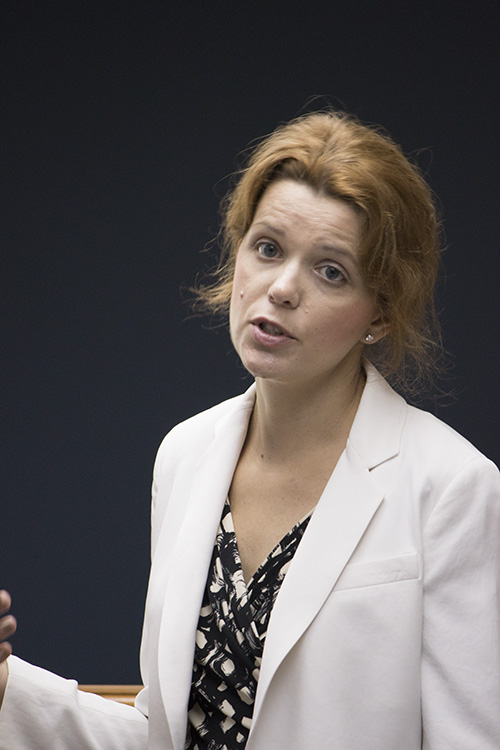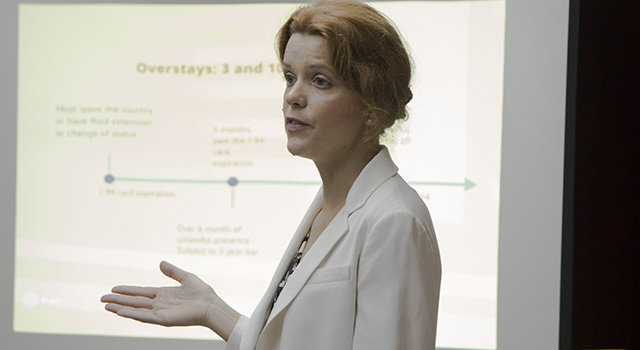By Priscilla A. Greear - Florida Catholic
MIAMI | Each year, the American Catholic Church sponsors foreign priests, nuns, brothers and other religious workers — from Mexico to India — to quietly fill shortfalls in holy orders and fortify ministries in dioceses across the United States.
The number of foreign-born priests serving in the U.S. increased from 3,500 in 1999 to the approximately 6,500 now serving in ministry, according to the Center for Applied Research in the Apostolate at Georgetown University.
And they infuse vital lifeblood into churches: CARA reports that the total number of priests in the U.S. dropped from 58,632 in 1965 to 38,275 in 2014, while the Catholic population grew from 46.3 to 66.6 million and the number of parishes remained constant at about 17,000.
Attorney Kate Kuznetsova, of the Maryland-based Catholic Legal Immigration Network, led a workshop at the end of October at the archdiocesan Pastoral Center to educate attorneys, archdiocesan employees, religious orders and others on critical issues for those coming to the U.S. to serve on the R-1 religious worker visa.
CLINIC serves 150 Catholic organizations including 70 dioceses and religious orders, and currently has 600 R-1 visa clients. The Archdiocese of Miami relies on its own Catholic Legal Services to process visas for its foreign-born priests and religious.
“We came to Miami to talk about immigration law for religious workers. We want them to be informed about their rights and responsibilities,” said Kuznetsova in a phone interview following the training. “We are located in Silver Spring, Md., but we work with religious workers all over the U.S.”

Photographer: ANA RODRIGUEZ-SOTO | FC
Kate Kuznetsova, a staff attorney with CLINIC, the Catholic Legal Immigration Network, details the ins and outs of obtaining and renewing religious visas for a group of Church representatives gathered in the archdiocesan Pastoral Center Oct. 27. CLINIC does the work for many dioceses and religious communities, as does Catholic Legal Services for the Archdiocese of Miami.
Kuznetsova, one of six CLINIC attorneys specializing in R-1 visas, explained that US Citizenship and Immigration Services created more stringent regulations for the R-1 visa application process in November 2008 to reduce fraud. Before the changes, the application process began in the religious workers’ home countries, where they presented paperwork from their U.S. sponsor at the local U.S. embassy.
Now the American sponsor must first submit detailed paperwork to the government to confirm the organization’s legitimacy, after which it receives an unannounced site visit.
“Once it is approved the person can apply for an R-1 visa to enter the U.S. Religious orders cannot really do it themselves,” Kuznetsova said.
In her presentation, she addressed practical topics such as how to avoid falling out of status, request extensions and file for permanent residency.
Religious workers, who often arrive with limited information and language barriers, will run into legal problems if they change employers and fail to have the new employer file a new I-129 petition for non-immigrant work. They then fall out of status and even risk deportation.
A common scenario CLINIC faces is where the new employer states that “the priest has been working for us for six months and we never did anything for him because he already had an R-1 visa,” Kuznetsova said. “When they change employers it should be approved before they switch employer. The religious worker is already in trouble and may not even know that.”
And it’s important for those seeking to adjust their status or begin the process to consult a lawyer experienced with R-1 visa processing, which not all immigration attorneys are, she added. CLINIC is available to help navigate the application process for Catholic organizations lacking internal legal counsel.
Father Emanuele De Nigris, rector of Redemptoris Mater Seminary in Hialeah, attended the training to get more information on behalf of four Italian lay missionaries who are assisting him on R-1 visas at the seminary, which is focused on formation of missionaries. While he also came from Italy in 1996 on an R-I visa, he gained updated information on topics such as the extension of the visa, which can be renewed after 30 months for a total of five years, and the petition process for permanent residency.
The U.S. government has been issuing an increasing number of religious worker visas, from 4,497 in 2010 to 6,123 in 2014. Of those issued for 2014, 45 percent, or 2,785, came from Asia, including 1,042 from India. North and Central Americans and Caribbean natives received 748, including 441 Mexicans, while Africans received 547, including 172 Nigerians. Of the 530 recipients from South America, countries with largest representations were Brazil and Colombia with 246 and 111 respectively.
Among South Floridians, Father Kuriakose Kumbakeel arrived in the U.S. from Kerala, India, in 2011 to serve a sabbatical year. He was marking the 26th anniversary of his ordination with the St. Thomas Syro-Malabar Catholic Diocese of Chicago, which sponsored him with legal counsel from CLINIC. He quickly found a new sense of mission as the Malabar Diocese only has eight seminarians.
“They asked me to serve in this diocese. I thought, OK I’ll try. We have sufficient priests in our diocese of India. There are lots of vocations.”
Father Kumbakeel first served in the Diocese of Oklahoma and was then transferred to South Florida where he pastors Our Lady of Health Church in Coral Springs, a congregation of 350 families hailing from West Palm Beach to Miami.
He now awaits approval for permanent residency, which will simplify travels back to India to visit his 93-year-old mother. But he feels at home in South Florida.
“It’s like my own country, lots of sunshine. All the fruits and veggies we get back home in Kerala — mango, jack fruit, coconuts,” he said. “I am happy to work here in this church and serve the St. Thomas Syro-Malabar Diocese of Chicago for the second half of my priesthood. I feel the faithful need my service here because the diocese does not have sufficient vocations to cater to the needs of the faithful.”

